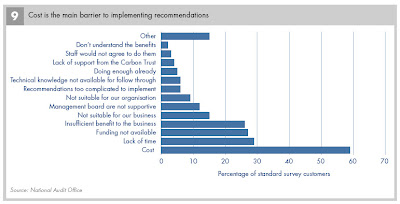That's probably because the advice largely consists of the blindingly obvious- eg they "helped" Manchester United FC by suggesting they turn off the lights in the stands at night. Brilliant. No wonder 20 per cent of customers say they would have made exactly the same changes without any Trust involvement whatsover, and 68 per cent would have made at least some of the same changes.
Does anyone actually pay for such advice? Hardly. The Trust's consultancy services are free to "customers", and while they reckon the "market" for advice is growing by 20% pa, the NAO says "there have been few new entrants to the market... growth is likely to reflect the Carbon Trust’s own market position"
So how do we know we're getting anything at all for our £103.2m? We have to trust the Trust's own calculations of how much carbon reduction its advice generates. And as the NAO notes: "Measuring impact in carbon terms is a relatively new area of expertise, robust methodologies for which are still being developed". Quite.
In a highly unsual step, the Trust has also set up a private equity company. A member of the PAC noted that this was the first public sector private equity fund he'd ever come across. The idea was to raise a £75m fund from private investors, leveraging the Trust's expertise and contacts. That failed, but there are major question-marks over even considering using a public sector resource in this way. Specifically, a large chunk of the rewards would have gone to employees.
According to the NAO: "CT Investment Partners LLP 75 per cent of which is owned by Carbon Trust Fund Management Holdings Limited (which is a wholly owned subsidiary of the Carbon Trust) and 25 per cent by Clean Tech Venture Partners (a partnership owned by two employees of CT Investment Partners). As part of the partnership arrangements, it was agreed that any future carried interest would be split 75 per cent to Clean Tech Venture Partners and 25 per cent to Carbon Trust Fund Management Holdings Limited. Clean Tech Venture Partners paid £50,000 for its interest in CT Investment Partners."
Get the picture? Those two lucky employees have put up just £50 grand, and on a multi-million tax funded pot, would have received 75% of all the Partnership''s "carried interest" returns (which would be 20% of all fund returns above a hurdle return of 6% pa). The head of the Carbon Trust told the PAC that a total £10m fund might generate a 3x return in three years, suggesting that was fine. But on our calculation that would leave the two employees with a return of £2.7m: nearly 300% pa. And on the same basis, a £75m fund would have generated a £20m return. Nice deal if you can get it.
This all looks like another grotesque waste of public money. The Trust talks the talk of "customer offer" and equity returns, but it's producing zilch pay-off in terms of cold hard cash. And while they theorise about government intervention being necessary to correct "market failure", with oil at $100 per barrel, we reckon the market will take care of energy efficiency a lot more dependably than a bloated half-baked quango.
We were disappointed the PAC let off Defra and the Trust so easily. It may be only £100 mill, but a hundred here, a hundred there.... etc.
